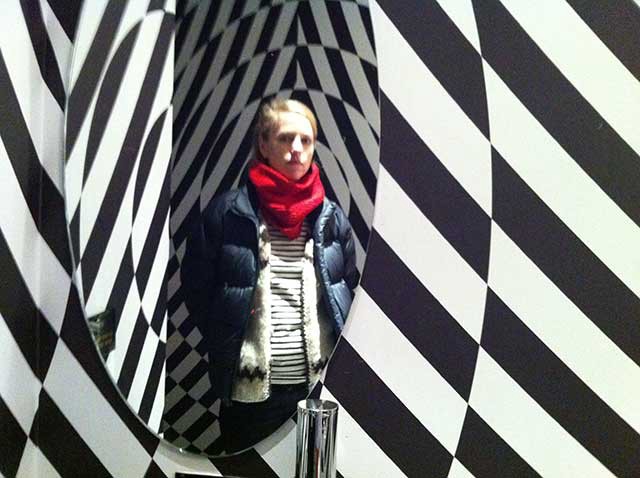The Threat Of Psychic Attacks! Heidi Julavits Explains It All To You
by Jenny Davidson

Heidi Julavits’s fourth novel, The Vanishers, sits at the perfect intersection of cerebral challenge and guilty pleasure. In the world of The Vanishers, psychic academies exist to foster talents like astral projection and mental telepathy; Julavits’ characters express hostility and attempt to dominate one another by way of psychic attacks that manifest in a horrifying array of physical symptoms (virulent rashes, bleeding gums, gastrointestinal distress). Across all of her novels, Julavits has explored women’s rivalries and what it means to want to disappear and reinvent oneself elsewhere in a different guise. The Vanishers calls to mind Kazuo Ishiguro’s The Unconsoled and William Gibson’s Pattern Recognition, and the novel’s haunted me ever since I read an advance copy this fall. I especially wanted to know more about the psychic attack and how it works: Julavits, my neighbor in a Columbia-owned apartment building in Morningside Heights, was kind enough to satisfy my curiosity in this email exchange.
Jenny Davidson: The description in the novel’s opening of the major physiological symptoms of a psychic attack is so convincing that I feel you must have undergone one at some point yourself. Why do acid reflux, bleeding gums and multiple rashes so convincingly speak to the fact of psychic attack?
Heidi Julavits: What’s great about psychic attacks — if you’re the attacker — is that it takes so long to diagnose them (this per their definition in Psychic Self Defense by Dion Fortune, which is where I first encountered the phenomenon) because they “present” as usual symptoms, if in unusual combinations. Thus your attackee spends quite a bit of time inexplicably miserable — again, according to Fortune — which is the point of psychically attacking a person in the first place. Maximum mysterious suffering.
Whether or not I believe in psychic attacks, the idea appealed to me for many reasons, and not just because I’ve been a rash sufferer in my day. Symptoms like rashes and upset stomachs and migraines (unlike, say, sore throats), especially when no quick diagnosis is available, are often attributed to stress. In other words — you’ve made yourself sick. The horror of your affliction becomes magnified if you’re seen as the person to blame for it. This “metaphorical” self-sickening template can shift into more medically valid territory — the world of the auto-immune disorder, for example. Some auto-immune disorders, however, to close the circle, are seen as stress-induced.
But if you’re being psychically attacked — hey! It’s not your fault! Someone else is making you sick. And it is all in your head. A person has psychically invaded your mind, and your body becomes corrupted, physically, by the mental pathogen. So this metaphorical-literal diagnostic collapse — plus my own tendency to get rashes — yeah. I found it pretty cathartic territory in which to muck around for 300-plus pages.
The main thing that I remember about Alasdair Gray’s Lanark, which I read as a teenager, is its amazing depiction of skin disease. Do you have any other favorite literary depictions of rashes and other dermatological disorders?
Nicholson Baker in U and I reads a lot into the psoriatic condition he shares with John Updike, i.e. he figures they must have a lot in common if they both suffer from the same skin disorder. That made a lot of sense to me; these visible bodily upsets can be viewed as the equivalent of having your secret — often shameful — inner self tattooed on your skin. If you have the same tattoo as another person, odds are you’ll get along.

Do you have any psychic powers yourself?
I can turn off street lamps by walking beneath them.
There’s an amazing passage where your narrator, her powers disabled, reflects on the experience of watching foreign films without subtitles or dubbed dialogue: “I’d become gifted at extrapolating story lines without the aid of a single comprehensible line of dialogue. These movies also made me miss my psychic forays less, these oblique glimpses into the lives of cinema strangers functioning as a plausible substitute.” I am fascinated by the truth of this observation and curious about how you came up with it. Have you ever had a period of watching undubbed foreign films, or was the origin of the insight more oblique?
I have lived in countries — for example, Japan — where I’d pay to see an English-language movie, and if it were dubbed in Japanese or one of the many other languages I don’t speak, I’d be reduced to lip reading, plus a lot of gestural interpretation. Once you get over the annoyance, it can be really instructive to experience a visual medium purely visually; you can discover a lot about how a movie is put together, but also to what degree people can accurately (or extracurricularly) communicate ideas and feelings without the use of words.
The spiritualism of the late 19th and early 20th centuries is permanently associated in my mind with the technologies and practices of that era: stenography, recording devices for dictation, radio, light projection, etc. How do email and the internet inflect the practices or potentialities of modern-day psychics?
“Psychic activity,” depending on whom you talk to, is seen as wave-based, meaning it’s a form of regularly available energy that certain people can harness or conduct. Do a quick Google and you’ll stumble upon, for example, an assertion like this: “Psychic powers work on two different levels: telekinesis on the delta wave pattern while telepathy is on an upper band.”
Given we’re surrounded by bandwidth and wireless signals, it struck me as a really great time to be a) a psychic and b) a dead person trying to communicate with the living. Wouldn’t it be way easier to hijack an email then it would be to manipulate more mechanical communication methods, like a Ouija board? Which is why my esteemed psychic scholar character, Madame Ackermann, makes a name for herself by writing a book called E-mails from the Dead. And which is why I have a special filter on my email account that junks unwanted missives from the astral plane.
Why are social networks a boon for psychic attackers?
I was having fun with the virus metaphor — you can get a computer virus from an email, why not an actual illness? Why couldn’t you be psychically attacked? Social networks thus, could raise the attack stakes considerably. Your identity is on display; you’re that much more vulnerable to malevolent infiltrations. But the infiltration possibilities run both ways. As a visitor to these sites, you risk encountering information that you’d sometimes wish you hadn’t. I recently spoke to a woman who Twitter-feed spied on a guy who’d dumped her, and thus she kept regular tabs on his new fabulous dating life, while also, inevitably, wishing terrible things to happen to him and his new girlfriend. This took a hefty psychological toll on her. Yet she couldn’t not do it. She was like one of those psychics who can’t stop seeing visions of future plane crashes and apocalypses. I feel like that, sometimes, especially after publishing a book. We’ve all become potentially helpless in the face of readily available information, even if it’s information that’s bad for our health.
Jenny Davidson teaches in the Department of English and Comparative Literature at Columbia University and blogs at Light Reading. She has just finished a novel called The Magic Circle.
